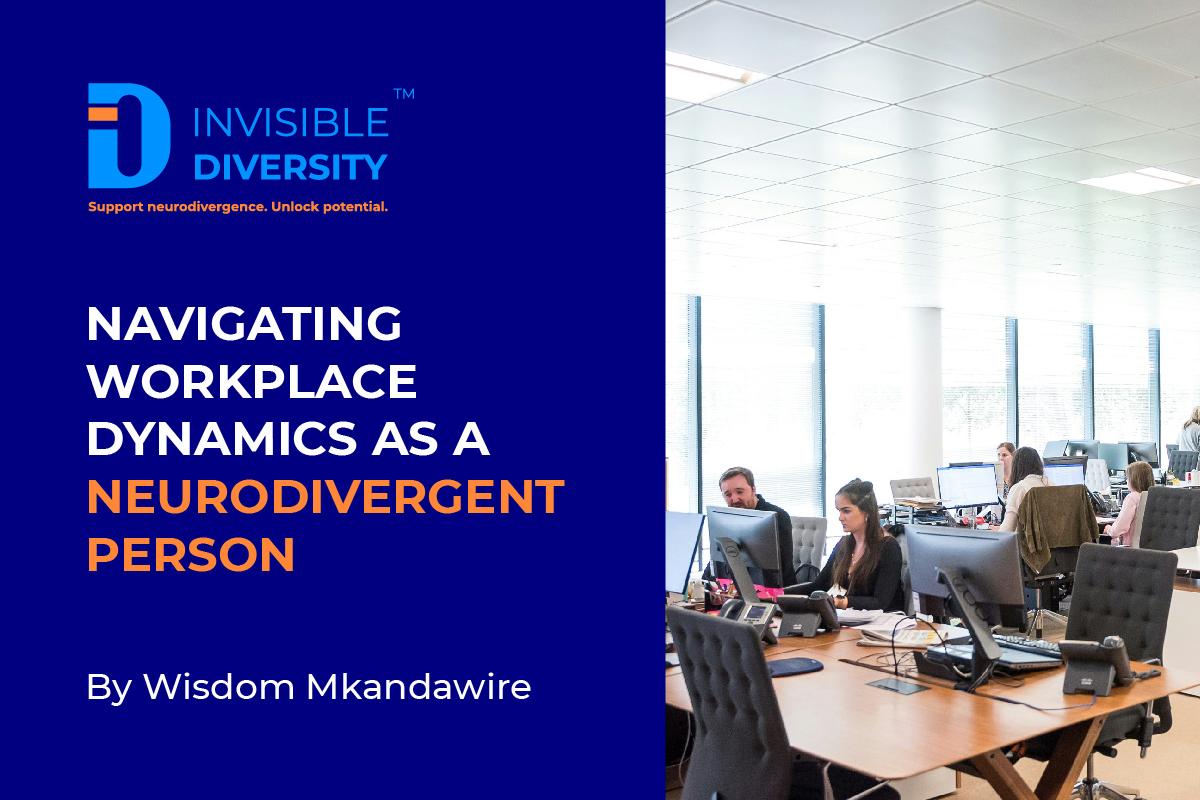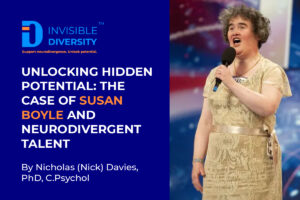Navigating workplace dynamics as a neurodivergent person
A little over two years ago I decided to write to my professional community that I identify as a neurodivergent person. Since then, I have been on a journey to understand the workplace, my role in it and what I (and people like me) might need to thrive. My life has been significantly transformed. It has become my mission to embrace neurodiversity and share what I have learned with other neurodivergent professionals. I have even founded (along with Nick (Nicholas) Davies, PhD, C.Psychol (BPS)) Invisible Diversity, a social enterprise dedicated to empowering neurodivergent professionals in the workplace while raising awareness about and advocating for neuro-inclusion in society in general.
Today, I share my personal experiences and insights on how to thrive in the workplace while embracing neurodiversity. Virtual office dynamics are a labyrinth of unspoken rules, hidden agendas, and intricate power dynamics. For neurotypical individuals, it’s already a complex enough dance, but for neurodivergent professionals such as autistics, the challenges can be significantly amplified!
In the 2024 neurodiversity research by Neurodiversity in Business (NiB) – the Neurodiversity Charity founded by Dan Harris FRSA; and Birbeck University reported that navigating workplace dynamics is one of the top three challenges faced by neurodivergent workers.
As someone who identifies as autistic, I’ve learned that understanding and navigating these dynamics requires both self-awareness and strategic finesse.
The Autistic Perspective
You see, autistic individuals often possess unique strengths such as attention to detail, intense focus, and unwavering dedication. However, these traits can clash with the unwritten norms of virtual office life. Some of the common challenges faced by autistic professionals include:
- Social nuances and non-verbal cues: Sometimes we may struggle interpreting subtle social cues, body language, and office banter. We might miss the raised eyebrow or the hidden agenda behind a seemingly innocuous comment. Strategy for success: Seek out mentors or colleagues who can provide candid feedback and consider explicitly asking for clarification when unsure about someone’s intentions.
- Networking and small talk: Networking events and water cooler conversations can be anxiety-inducing and autistic professionals may find small talk draining or even meaningless. Strategy for success: Play to your strengths and focus on quality over quantity focus on building deeper connections with a few colleagues rather than trying to befriend everyone. Find common interests beyond work-related topics.
- Informal workplace chatter and cliques: Autistic individuals might struggle to navigate gossip circles or cliques. We tend to value honesty and authenticity, which can clash with the politics of alliances. Strategy for success: Stay neutral and avoid taking sides. Focus on your work and maintain professionalism. Seek out like-minded individuals who appreciate your authenticity.
- Advocacy and self-promotion: I’ve found that I often downplay achievements, assuming my work will speak for itself. However, self-advocacy is essential for career growth and progression. Strategy for success: As unnatural as it might seem, practice articulating your accomplishments. Create a portfolio or document your contributions so you can share your successes during performance reviews or team meetings or even casual conversations with your boss and colleagues.
Other Strategies for Success
Fear not, it is not all doom and gloom – there are some simple strategies I’ve employed to help craft a work culture and space that is more conducive to neurodivergent persons’ success:
- Learn the unwritten rules: Observe how successful colleagues navigate office politics. Pay attention to communication styles, power dynamics, and unwritten norms. Strategy: Read books or attend workshops on workplace dynamics. Seek guidance from mentors who understand the organisational landscape.
- Build allies and allyships: Identify allies who appreciate your unique perspective. Allies can help you navigate tricky situations and advocate for your needs. Strategy: Be genuine and build strong, authentic relationships. Focus on shared goals and mutual respect.
- Embrace your strengths: Some autistic traits can be assets. Leverage your attention to detail, analytical skills, and reliability. Strategy: Communicate your strengths to colleagues and supervisors. Show how your unique abilities contribute to team success.
- Structured collaboration: Agenderless free-flowing brainstorm meetings can be totally overwhelming for the detail orientated professional. It can feel nearly impossible to follow the ever-changing stream of the conversation, so it is hard to meaningfully add your perspective. Strategy: Require an agenda and, where possible, a pre-read and assign a chair of the meeting to direct conversation. Use brainwriting as a technique to generate ideas and GenAI tools such as Microsoft Copilot to organise your thoughts ahead of meetings. That way you, will be primed and ready to share your input. This is not only good for you, but it will focus the meeting and its outcomes for all. Honestly it is just good meeting etiquette! Remember your individual creativity, if harnessed well, can lead to group wisdom.
- Self-care and boundaries: Office politics can be draining. Set boundaries to protect your well-being. Strategy: Schedule breaks, practice mindfulness, and find activities that recharge you. Remember that it’s okay to say no when necessary.
Navigating virtual office dynamics as an autistic professional is a journey of resilience and growth. Embrace your neurodivergence, seek understanding, and remember that your unique perspective adds tremendous value to the workplace. By combining self-awareness with strategic adaptation, you can thrive in any organisational landscape.
Remember, you’re not alone, my friend. Many neurodivergent professionals have faced similar challenges and emerged stronger – you too can play to win and craft a workplace set up for your success!
Disclaimer: The views expressed in this article are solely those of the author and do not represent any specific organisation or group.




